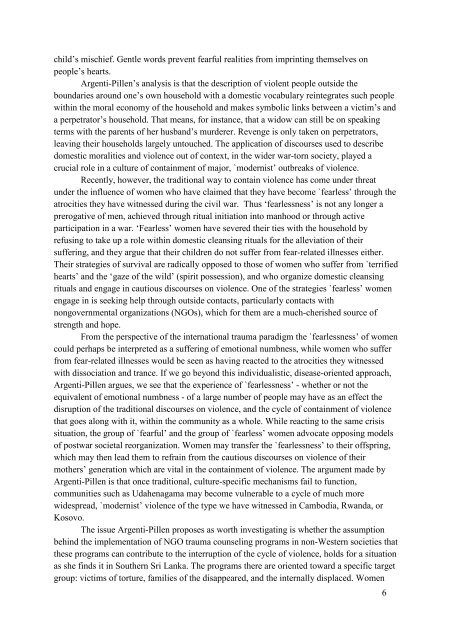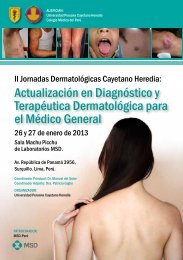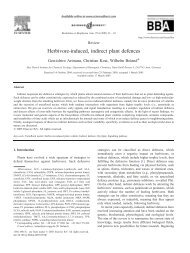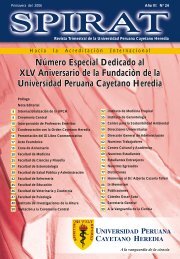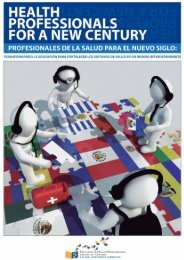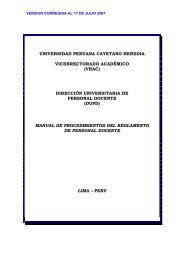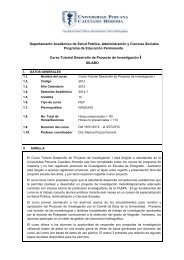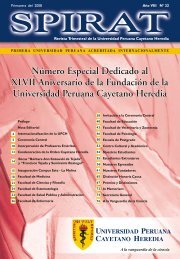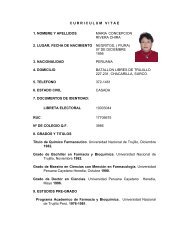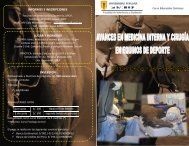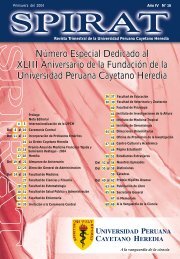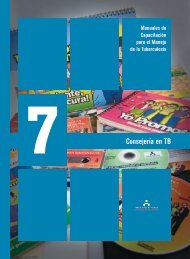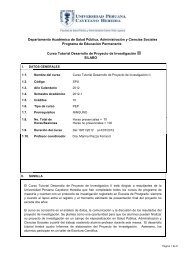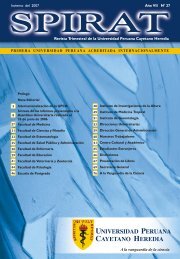1 TRAUMA AND HEALING: CROSS-CULTURAL AND ... - UPCH
1 TRAUMA AND HEALING: CROSS-CULTURAL AND ... - UPCH
1 TRAUMA AND HEALING: CROSS-CULTURAL AND ... - UPCH
You also want an ePaper? Increase the reach of your titles
YUMPU automatically turns print PDFs into web optimized ePapers that Google loves.
child’s mischief. Gentle words prevent fearful realities from imprinting themselves onpeople’s hearts.Argenti-Pillen’s analysis is that the description of violent people outside theboundaries around one’s own household with a domestic vocabulary reintegrates such peoplewithin the moral economy of the household and makes symbolic links between a victim’s anda perpetrator’s household. That means, for instance, that a widow can still be on speakingterms with the parents of her husband’s murderer. Revenge is only taken on perpetrators,leaving their households largely untouched. The application of discourses used to describedomestic moralities and violence out of context, in the wider war-torn society, played acrucial role in a culture of containment of major, `modernist’ outbreaks of violence.Recently, however, the traditional way to contain violence has come under threatunder the influence of women who have claimed that they have become `fearless’ through theatrocities they have witnessed during the civil war. Thus ‘fearlessness’ is not any longer aprerogative of men, achieved through ritual initiation into manhood or through activeparticipation in a war. ‘Fearless’ women have severed their ties with the household byrefusing to take up a role within domestic cleansing rituals for the alleviation of theirsuffering, and they argue that their children do not suffer from fear-related illnesses either.Their strategies of survival are radically opposed to those of women who suffer from `terrifiedhearts’ and the ‘gaze of the wild’ (spirit possession), and who organize domestic cleansingrituals and engage in cautious discourses on violence. One of the strategies `fearless’ womenengage in is seeking help through outside contacts, particularly contacts withnongovernmental organizations (NGOs), which for them are a much-cherished source ofstrength and hope.From the perspective of the international trauma paradigm the `fearlessness’ of womencould perhaps be interpreted as a suffering of emotional numbness, while women who sufferfrom fear-related illnesses would be seen as having reacted to the atrocities they witnessedwith dissociation and trance. If we go beyond this individualistic, disease-oriented approach,Argenti-Pillen argues, we see that the experience of `fearlessness’ - whether or not theequivalent of emotional numbness - of a large number of people may have as an effect thedisruption of the traditional discourses on violence, and the cycle of containment of violencethat goes along with it, within the community as a whole. While reacting to the same crisissituation, the group of `fearful’ and the group of `fearless’ women advocate opposing modelsof postwar societal reorganization. Women may transfer the `fearlessness’ to their offspring,which may then lead them to refrain from the cautious discourses on violence of theirmothers’ generation which are vital in the containment of violence. The argument made byArgenti-Pillen is that once traditional, culture-specific mechanisms fail to function,communities such as Udahenagama may become vulnerable to a cycle of much morewidespread, `modernist’ violence of the type we have witnessed in Cambodia, Rwanda, orKosovo.The issue Argenti-Pillen proposes as worth investigating is whether the assumptionbehind the implementation of NGO trauma counseling programs in non-Western societies thatthese programs can contribute to the interruption of the cycle of violence, holds for a situationas she finds it in Southern Sri Lanka. The programs there are oriented toward a specific targetgroup: victims of torture, families of the disappeared, and the internally displaced. Women6


